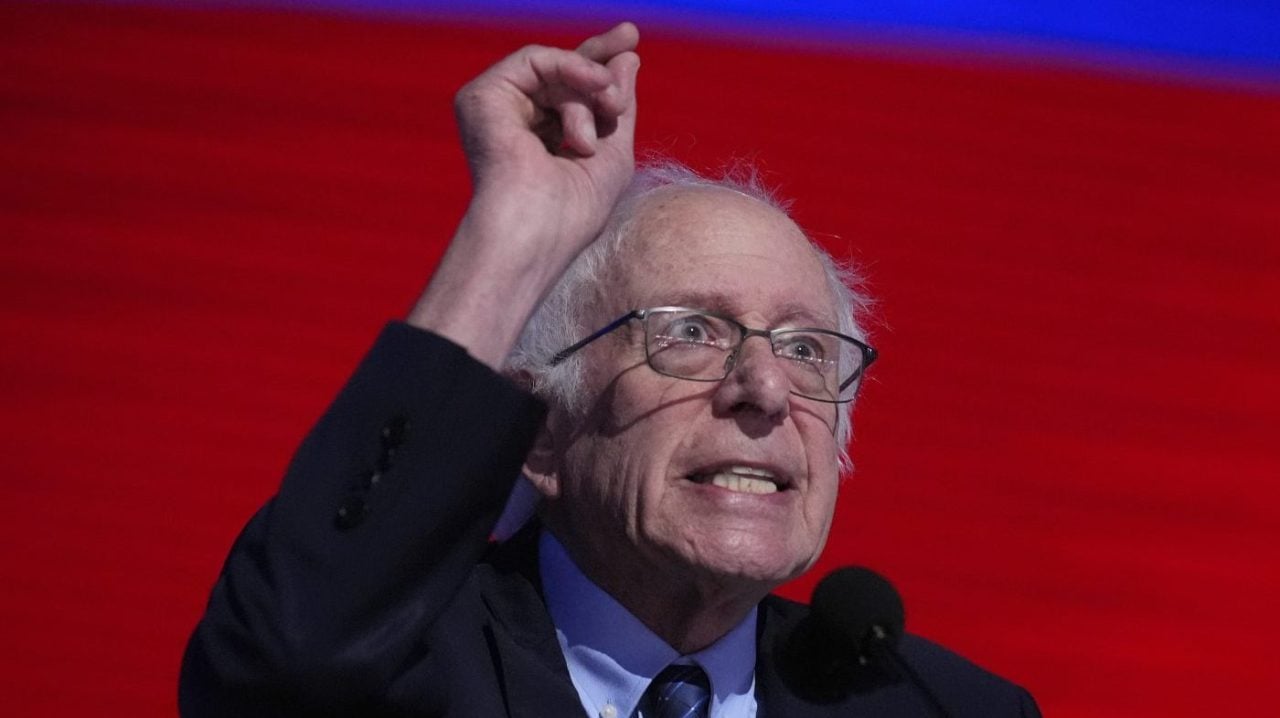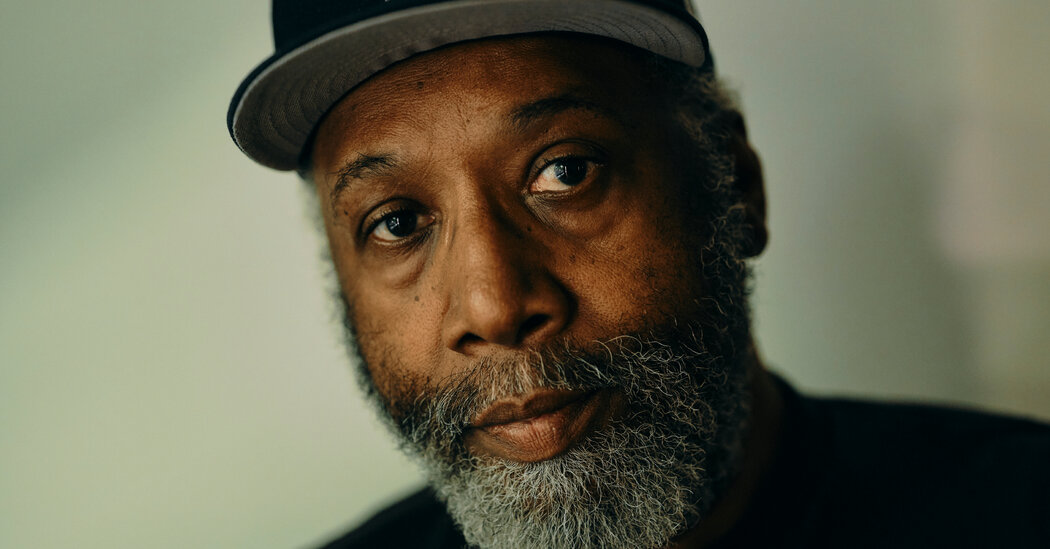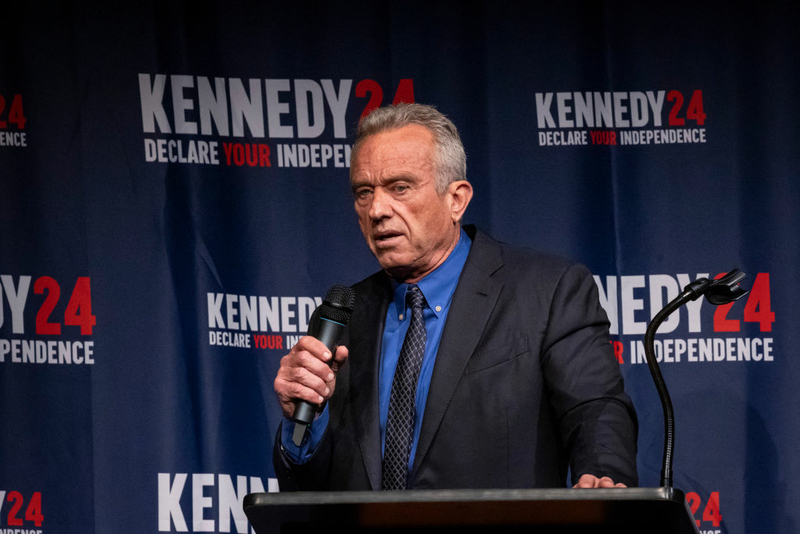
We know. We've tried to tell them. If he wins, Palestinians will be exterminated and their supporters jailed for "supporting terrorists" or "threatening national security" or "antisemitism", or some other such bullshit.
But sure, take a stand to teach Kamala and the DNC a lesson. That'll really show those awful Democrats...juuuuuust before they lurch to the right and completely abandon the far left for the foreseeable future.
Is it just or fair? Shit no. Will it happen if Trump wins? You fucking betcha.
I didn't say you are, nor was I responding to you. I was giving them the term they were trying to define.
It's called "presupposing a frame", and Innuendo Studios did a really good piece about it here.
Per Rule 1, do not respond to rule-breaking content; report it and move on.
Per Rule 1, do not respond to rule-breaking content; report it and move on.
There are just under 200,000 registered Republicans in Wyoming. If ~200,000 Democrats moved there long enough to establish residence, they could get a Democratic senator in 2026. Doesn't seem insurmountable.
That only makes sense if you view the electorate as though on a linear spectrum (and are standing squarely on "the left"). If you view it more like this, then it helps explain phenomena like this where ~15% of moderate/liberal Republicans routinely vote for Democrats, as opposed to ~7% of conservative/moderate Democrats going the other direction. It also helps explain issues where Trump outflanks Democrats on the left, which tends to attract Sanders-Trump voters.
edit: I'll add that the downvoting on perfectly matter-of-fact comments in this thread (and quite frankly, most others on Lemmy/Reddit) is a really crisp display of the left's toxic intolerance that Trump so readily and effectively leverages with middle America. Hammer that button, folks. In an infinitesimal way you're proving Trump right every time you do.
100%. It's fucking weird to empathize with people I've hated for so long, even if only microscopically. I still don't know how to reach them, but I feel it.
I'm not sure where I made that assumption?
Yeah I completely agree. Implicit bias is a universal human trait, and I've consciously tried to be aware of the times it rears its ugly head. That's why I was so caught off guard, because I'm usually on the lookout for stuff like that. My best friend is a director at a media company, and he's spent nearly 2 years carefully documenting his interactions with a black, female subordinate of his. She's generally a really bad employee, a poor worker, antagonistic to colleagues, and all around a sour human being, but he can't discipline her the way he disciplines his other employees because she and her sister (who works under another director) readily claim that they're being discriminated against, no matter how innocuous the interaction or how mundane the offense. They've had to fire white, cis male employees with better track records because they're afraid that if they fire her she'll take them to court. He's a lifelong Republican who registered as a Democrat after 2016 and voted straight-ticket Dem this election, but he regularly confides in me that he's deeply frustrated with the way he has to interact with these sisters. He has to constantly look over his shoulder, he has to treat her with kit gloves, and he has to document every word he speaks to her so there's a detailed record of their conversations. I'm not saying she's not actively discriminated against in her daily life because I'm sure she 100% is, but I'm also not saying she's not taking advantage of this cultural moment to re-construct the power dynamic with the white male supervisor below her, no matter the needs of the business. This is why blue collar Trump supporters so routinely crow about people "playing the race card", because some people actually do.
We're not in a healthy place as a society, and extremists/activists on both sides are really bad at self-reflection.
I needed that Nate Silver article. Thanks for linking.
So I have a personal example, and I'll keep it brief because there's a lot of really detailed nuance here.
I was holding a meeting about 2 years ago, and someone recommended a follow up sub-committee meeting. I told them I'd pull together a small group of people to hold a "pow wow". An Asian-American girl in the meeting who's your prototypical hyper-aware leftist reached out to me after the meeting. She handled it 100% professionally and exactly the way she should have, and she politely said, "I didn't want to say something during the meeting because I know you didn't mean anything by it, but I do cringe a bit when you call your meetings a 'pow wow.' I just thought you should be aware." I thanked her for pointing it out, apologized that it was something I'd always said almost unconsciously, and told her I'd try to do better in the future.
I've thought about that interaction for years. There's something in my lizard brain that feels almost offended that she'd call me out for something like that. I consider myself to be a keenly aware left-leaning person, and I'm quite sensitive to racial or sexuality-based jokes. I run in some conservative circles, so these kinds of jokes are common. Though this particular confrontation shouldn't bother me, for some reason deep down it does. My irrational, emotional brain wants to say, "That's not fair! You know I didn't mean anything by it! I'm not racist!", and my rational brain just says, "No big deal, be better in the future."
I can't explain why it's so deeply unsettling to be called out for doing something racist when I clearly didn't mean it that way. But it does help me understand a right-leaning person who's used to building social capital by telling racially-charged jokes that were probably very funny 10-15 years ago. Suddenly they're not just living in a culture that doesn't find those things funny, they're surrounded by people who readily call them "racist" for repeating jokes they've probably heard dozens of times from other people. I do not think those kinds of people are racist, I just think they grew up surrounded by subconsciously-racialized tropes, and they're simply reflecting those tropes back out into the world. And I now know how deeply painful it can be to be called a racist when you 100% didn't intend it that way. I'm sure there's a spectrum of intent and personal reflection, and some people fall closer to the "racist" end of the spectrum, plus some people think more or less about how they're perceived by other people, but I understand their pain now. I cringe when the left so readily throws out these labels, not because they're not true on some level, but because they're "othering" to people who might be sandwiched between cultural sub-groups, and those kinds of attacks aren't going to make those people more reflective or open to your arguments.
a clear bias for Trump.
This is the “mixed results” or unclear signal we’re seeing.
Can you square this for me?
Though enough that based on early voting the Harris campaign cancelled ad-buys in NC, because the EV exit polls showed a clear bias for Trump. So at least in that race, whatever their strategy was, didn’t work.
Where are you seeing those exit polls?
So…. 72% of democrats is too low of a number for government run healthcare for the DNC to care? What happened to doing what a significant majority of your voters want?
Yes, and did you also see that independents are split 50-50? Even if you got 100% of Democrats you'd still lose scores of swing states without independents, whose views are much more nuanced. It's also important for national campaigns to identify exactly who those voters are. If that 72% will vote for you no matter what, but the remaining 26% will vote GOP or sit out if you push too aggressively toward government-run healthcare, then again it's political suicide to cater exclusively to them. Unfortunately the healthcare debate doesn't exist in a vacuum. Democrats went pretty far out on a limb with the ACA and still paid dearly over the next few election cycles.
Also, man you tell me vote if I want to matter then tell me I don’t matter.
I'm telling you that your personal preferences aren't the only thing a politician cares about. They care about public opinion in aggregate. Your personal opinions are irrelevant to this discussion because they don't always reflect majority opinion, and national politics is a game played at the margins in only a handful of states.
Which is it. That progressives as a whole need to vote if they want to matter?
They need to organize at the grassroots level, get involved in party politics, and expand their coalition. Majority coalitions are difficult to build but also difficult to disentangle once they're established.
Literally the group by your own polls data you were using that votes the most. Like lol.
In 2020 and increasingly so, yes. But farther back that wasn't necessarily true. The coalitions who have the most influence now are more or less holdovers from the 1990s and 2000s. Engagement along the ideological spectrum didn't really start changing until after Obama, and you're currently part of an active realignment. That doesn't mean you'll get everything you want right out of the gate, though.
Anyways, again, while it may only be 6% as I’ve been saying we do not need a perfect representative. I do not expect a fucking communist president. Just do some of the extremely popular progressive platforms such as healthcare for all or etc. then do your normal liberal shit for everything else idgaf.
Two things. First, I haven't actually told you how I identify or what I believe. I'm simply telling you how progressives are or aren't represented in major voter statistics. Second, if you zoom out a bit (like multiple decades) you'll find that the Democratic Party has actually made significant strides leftward in terms of abortion rights, healthcare, unions, and green energy investment. Sure for every major accomplishment there's another drawback or step in the wrong direction (investment in green energy but ALSO fossil fuels, for example), but a cruise ship cannot be steered on a dime. Dramatic shifts take time, and coalitions take years and decades to form or dissolve.
But if you want to lose 12% of your base then whatever. Hope you pick up enough republicans I guess. Have fun with that. But don’t be surprised that the single group that has the highest % voter turnout ignores you when you actively antagonize them, shit on their ideals, and tell them they don’t matter, while simultaneously blaming them when you lose, and suing any party that represents them off ballots. Thanks for reminding me not to let them have my vote because they don’t deserve shit when they pull shit like this trying to pretend progressives don’t matter tho. I was almost on the fence.
Again, this has nothing to do with me. Not sure why you're so wedded to this being an ideological battle between the two of us, as opposed to an observation about national realities. Progressives are not a majority in this country or the Democratic Party. That means they have to be creative and deliberate in how they influence elections. It also means they're often not going to get what they want, but that's ok because nobody gets what they want.
Anyway, it's clear you take this very personally, so I'll leave it there.
Amazing what happens when you dig beneath soundbytes on healthcare:
Also, until a majority votes based on Gaza and money in politics, neither will be addressed. Just because someone agrees with you doesn't mean it will affect their vote. Sad but true.
Actively ignoring 24% of your base seems fucking crazy, but again.
That's called "doing what a significant majority of your voters want." Not doing so would be political suicide.
Also I’ve voted in every major and minor election since I turned 18. But my favourite part is you’re supposed to vote.
This is not about you. You are not the center of the universe.
But then they look at less than a third of a percent of the vote going to progressive party and ignore us.
Yes, that's called "doing what a significant majority of your voters want." Again. I don't know why that's such a foreign concept.
Retroactive correction
I actually misspoke on the first comment and double checked my source. Progressives are 12% of the left, which comes to 6% of the overall population. Despite how overwhelmingly popular progressives consider themselves to be, they are a very small minority on the national stage. Like vanishingly small. Catering to their priorities at the expense of everyone else's would be patently ridiculous and a surefire way out of office in all but the smallest Congressional districts.
So two things:
-
2020 saw 66% voter turnout, and 2018 saw 49% turnout. Both are records for a presidential and non-presidential year. Only 37% of Americans voted in all three elections in 2018, 2020, and 2022. Politicians do care about what their constituents want/need. They do listen. But they only care about and listen to the ones who vote. People who don't vote don't get a say, it's really as simple as that, and the online cohort that cries most loudly about third parties and alternative means of governance usually does exactly zero between presidential election years to make any of that viable. Jill Stein will disappear again until 2028, like clockwork.
-
Progressives are only about
12%6% of the population (corrected). What you want is only a small part of the overall picture. The fact remains that just because you don't feel like politicians are listening to you doesn't mean they're not listening to the huge numbers of people elsewhere on the political spectrum who probably fundamentally disagree with you on a number of different issues and think of something completely different when they talk about what they want in the healthcare system.
Being a part of a pluralistic democracy means having to wrestle with the fact that you are not the center of the universe, and that the entire population probably doesn't think like you do, and they get to vote, too.
Now to say that you cut family off because of how they vote
But cutting family off because they share a different political viewpoint
Again, that's not what's happening here. Stop misrepresenting what people are saying to you.
People who snivel about sensitive feelings when they have absolutely no idea
This you?
The way people are writing off family instead of just talking to them is awful.
This is the most circular argument I've ever been a part of. Can't say I didn't try.
I have friends who were abandoned by their parents and subsequently adopted. I lost a half-sibling with mental illness after their religious paternal family subjected them to actual exorcisms and other emotional trauma which eventually led to their suicide. My wife has a new 60-year old biological sister that she discovered 2 years ago via DNA. I have friends who cut ties with physically and sexually abusive parents. Family is quite mutable, we are under no obligation to hold fast to toxic blood relatives, and in many cases what we consider "reprehensible" depends entirely on how "reprehensible" the blood relative's committed offenses are.
I'm going to assume you're just arguing from extremely limited personal experience and save the long list of expletives I want to hurl at you on behalf of my friends and family because I'd prefer not to be banned from this community. Good day to you.
Trust me, most of us have tried and tried and tried and tried and tried and tried. Some certainly may have preemptively cut people out without discussion, but most of us have beaten our heads against a wall for almost a decade now, trying to convince them that we're human beings with dignity who deserve respect. We just withdraw from engagement, piece by piece, until there's nothing lost by just giving up. Cutting them off is usually the last and most consequential move, rather than the first.
Sen. Bernie Sanders (I-Vt.) said Sunday he believes former President Trump will have similar views of the Israel-Hamas war to those of Israeli Prime Minister Benjamin Netanyahu if he is reelected. …

> “To those people who are saying, ‘Well, I can’t support Harris because she disagrees [with] Trump on that issue’ … he will be closer to Netanyahu,” Sanders said on CNN’s “State of the Union.”
> Sanders said he thinks Vice President Harris can be moved “on that issue” of the Israel-Hamas war.
> Harris has called for a cease-fire deal and pushed for the war in Gaza to end, but she faces scrutiny from both sides — from people who want to see Hamas defeated and those who call for the end of the war in Gaza.
> “So, if we are able to elect Harris, I think we’re going to have an opportunity to move her on that issue, to make it clear, we cannot allow children in Gaza to starve to death,” Sanders said. “She will be open to that. I doubt that Trump will.”
> Trump told Benjamin Netanyahu in one call this month, “Do what you have to do,” according to six people familiar with the conversation who spoke on the condition of anonymity to discuss sensitive and confidential information. Trump has said publicly that the two have spoken at least twice in October, with one call as recently as Oct. 19.
> “He didn’t tell him what to do militarily, but he expressed that he was impressed by the pagers,” said Sen. Lindsey Graham (R-South Carolina), who was on a call this month with Trump and Netanyahu, referring to the Israeli operation that killed Hezbollah leaders with explosive batteries inside pagers. “He expressed his awe for their military operations and what they have done.”
> Graham added: “He told them, do what you have to do to defend yourself, but we’re openly talking about a new Mideast. Trump understands that very much there has to be change with the corrupt Palestinian state.”
YouTube Video
Click to view this content.

> But the lack of a good story is hurting Israel in other ways. Israelis are being asked to send their sons and daughters to fight every day against Hamas and Hezbollah foes — yet cannot be sure if they are going to war to save the state of Israel or the political career of their prime minister.
> Because there is more than enough reason to believe that Bibi wants to keep this war going to have an excuse to postpone testifying in December at his corruption trial, to postpone an independent commission of inquiry as to how his government failed to prevent the worst attack on Jews since the Holocaust, as well as to forestall new Israeli elections and maybe even to tilt our presidential election to Donald Trump. Netanyahu’s far-right Jewish supremacist partners have told him they will topple his government if he agrees to stop the war in Gaza before an undefined “total victory” over Hamas and if he tries to bring the West Bank’s Palestinian Authority, which has embraced the Oslo peace process, to help govern Gaza in the place of Hamas — something that Hamas greatly fears.
> This absence of a story is also hurting Israel strategically. The more Israel has a legitimate Palestinian partner, like a reformed Palestinian Authority, the better chance it can get out of Gaza and not preside over a permanent insurgency there, the more allies will want to help create an international force to fill any vacuum in Southern Lebanon and the more any Israeli military strike against Iran would be understood as making Israel safe to try to make peace with the Palestinians — not safe for an Israeli annexation of the West Bank and Gaza, which is what some of Netanyahu’s far-right partners are seeking.
> I cannot guarantee that there is a legitimate Palestinian partner for a secure peace with Israel. But I can guarantee that this Israeli government has done everything it could to prevent one from emerging — by strengthening Hamas in Gaza at the expense of the Palestinian Authority in the West Bank.
It doesn’t mean content moderation is biased, study finds
>Late in Tuesday night’s vice-presidential debate, Sen. JD Vance (R-Ohio) dodged a question about whether he and running mate Donald Trump would accept the 2024 election results by pivoting to a favorite topic: what he called the “censorship” of Americans by social media companies, terming it “a much bigger threat to democracy.”
> His statement drew on a years-long Republican contention that Silicon Valley tech giants have suppressed conservative views on platforms such as Facebook, Instagram, YouTube and Twitter. That narrative has underpinned congressional hearings, Republican fundraising campaigns, the dismantling of academic research centers, Elon Musk’s purchase of Twitter, state laws seeking to restrict online content moderation, and multiple lawsuits that reached the Supreme Court this year.
> But is it true? Well, yes and no, according to a study published Wednesday in the journal Nature.
> Conservatives and Trump supporters are indeed more likely to have their posts on major social media platforms taken down or their accounts suspended than are liberals and Joe Biden supporters, researchers from Oxford University, MIT and other institutions found. But that doesn’t necessarily mean content moderation is biased.

> Over the past 15 years, North Carolina lawmakers have rejected limits on construction on steep slopes, which might have reduced the number of homes lost to landslides; blocked a rule requiring homes to be elevated above the height of an expected flood; weakened protections for wetlands, increasing the risk of dangerous storm water runoff; and slowed the adoption of updated building codes, making it harder for the state to qualify for federal climate-resilience grants.
> Those decisions reflect the influence of North Carolina’s home building industry, which has consistently fought rules forcing its members to construct homes to higher, more expensive standards, according to Kim Wooten, an engineer who serves on the North Carolina Building Code Council, the group that sets home building requirements for the state.
> “The home builders association has fought every bill that has come before the General Assembly to try to improve life safety,” said Ms. Wooten, who works for Facilities Strategies Group, a company that specializes in building engineering. She said that state lawmakers, many of whom are themselves home builders or have received campaign contributions from the industry, “vote for bills that line their pocketbooks and make home building cheaper.”
After a bit of discussion with @laverabe, we've agreed to update the sidebar with a more specific rule set. We have about 2 decades of moderation experience between us, and we're more or less on the same page about how to kick-start the community and get things rolling.
To put it simply, we are significantly less interested in enforcing our rules on opinions or content than we are on behavior and your treatment of others. Barring truly horrific opinions (which probably violate Lemmy's ToS in the first place), we're open to any and all perspectives, no matter how tasteless, crass, or toxic other people may believe them to be. There is no shortage of people on the left who think people on the right should be censored, just as there's no shortage of people on the right who think people on the left should be censored. We will not censor opinions because they're liberal, conservative, libertarian, egalitarian, utilitarian, humanitarian, Rastafarian, muggle, sith, Borg, etc. We will remove content that's abusive. So just don't be an asshole and everything will be peachy.
This forum is not meant to be focused on any particular topic or region, but we reserve the right to remove content on the rare occasion that it doesn't suit the purpose of the community. Given that nearly everything is political nowadays, that might be an entirely moot point, but just in case we ask that you not post lasagna recipes, driving directions, product reviews, or other unrelated stuff.
Content Rules:
- Self posts only.
- Opinion pieces and editorials are allowed on a case by case basis.
- No spam or self promotion.
- Do not post grievances about other communities or their moderators.
Commentary Rules
Obey the golden rule: treat others as you would like to be treated.Don't be a jerk or prevent honest discussion.- Stay on topic.
- Don’t criticize the person, criticize the argument.
- Provide credible sources whenever possible.
- Report bad behavior, please don’t retaliate. Reciprocal bad behavior will reflect poorly on both parties.
- Seek rule enforcement clarification via private message, not in comment threads.
- Abide by Lemmy's terms of service (attacks on other users, privacy, discrimination, etc).
Please upvote/downvote based on quality of contribution to the discussion, not based on whether or not you agree with the post or comment.
Since our rules are new, we'll probably issue a lot of warnings in the early stages. We're not expecting to issue any bans unless something is truly out of bounds and unproductive. We're also just humans who have actual jobs, so we just don't have time to babysit folks who can't be cooperative.
Please provide your thoughts on anything you think should be more or less specific, as well as added or removed. We can't promise that we'll see eye to eye, but we'll make every effort to help you understand where we're coming from and how we see the community developing.
Edit: Updated rule 1 to be more specific, in case someone decided to be rude because they get their rocks off by fighting.
At the Jackson Hole Economic Symposium, Jerome Powell hinted at upcoming Fed interest rate cuts due to easing inflation and a cooling job market.
> The Federal Reserve is ready to cut interest rates, confident that inflation is easing to normal levels and wary of any more slowing in the job market.
> “The time has come for policy to adjust,” Fed Chair Jerome H. Powell said Friday, in his most anticipated speech of the year. “The direction of travel is clear.”
> Powell did not specify a timeline, or forecast how much Fed leaders were preparing to lower rates. But his remarks came as close as possible to teeing up a cut at the Fed’s next policy meeting in mid-September. Rates currently sit between 5.25 and 5.5 percent, where they have remained since July 2023. The open question now is whether officials will opt for a more aggressive cut next month — a half-point instead of a more typical quarter-point.
> On the final, and most anticipated, night of the four-day Chicago convention, Harris, 59, promised to chart a "New Way Forward" as she and Trump, 78, enter the final 11 weeks of the razor-close campaign.
> After days of protests from Palestinian supporters who were disappointed at not getting a speaking spot at the convention, Harris delivered a pledge to secure Israel, bring the hostages home from Gaza and end the war in the Palestinian enclave.
> "Now is the time to get a hostage deal and a ceasefire deal done," she said to cheers. "And let me be clear, I will always stand up for Israel's right to defend itself and I will always ensure Israel has the ability to defend itself."
> "What has happened in Gaza over the past 10 months is devastating. So many innocent lives lost, desperate hungry people fleeing for safety over and over again. The scale of suffering is heartbreaking," she said.
For a while, I couldn’t find a single protester outside the convention, much less a Chicago seven.
> They said tens of thousands of protesters would be here. They claimed they would “shut down the DNC for Gaza.” Like the Chicago riots during the 1968 Democratic convention, their demonstrations would snarl the city, shake the party and doom the candidacy of “Genocide Joe.”
> Then came Kamala Harris — and the protest fizzled.
> Organizers anticipated there would be 30,000 to 40,000 protesters on hand for Monday’s kickoff. But only a few thousand showed up; police estimated 3,500
Chris Murphy has been trying to understand why our version of liberalism — emphasizing free markets and consumer choice — feels to many like a dead end.

> In December 2022, early into what he now describes as his political journey, Senator Chris Murphy of Connecticut gave a speech warning his fellow Democrats that they were ignoring a crisis staring them in the face.
> The subject of the speech was what Mr. Murphy called the imminent “fall of American neoliberalism.” This may sound like strange talk from a middle-of-the-road Democratic senator, who up until that point had never seemed to believe that the system that orders our world was on the verge of falling. He campaigned for Hillary Clinton against Bernie Sanders during the 2016 primaries, and his most visible political stance up until then was his work on gun control after the Sandy Hook shooting.
> Thoughtful but prone to speaking in talking points, he still comes off more like a polished Connecticut dad than a champion of the disaffected. But Mr. Murphy was then in the full flush of discovering a new way of understanding the state of the nation, and it had set him on a journey that even he has struggled sometimes to describe: to understand how the version of liberalism we’d adopted — defined by its emphasis on free markets, globalization and consumer choice — had begun to feel to many like a dead end and to come up with a new vision for the Democratic Party.
...
> Mr. Murphy is a team player and has publicly been fully supportive of Ms. Harris, but he also wants Democrats to squarely acknowledge the crisis he believes the country is facing and to offer a vision to unmake the “massive concentration of corporate power” that he thinks is the source of these feelings of helplessness and hopelessness. Only by offering a “firm break” with the past, he believes, can Democrats compete with Republicans like JD Vance, who, with outlines like Project 2025, have a plan to remake American statecraft in their image and who are campaigning on a decisive break with the status quo.
> Academics, think tanks and magazines are buzzing with conversations about how to undo the damage wrought by half a century of misguided economic policies. On the right, that debate has already spilled out into the public view. But on the center-left, at least, very few politicians seem to be aware of this conversation — or at least willing to talk about it in front of voters.
Two federal agencies, backed by ample funding from Congress, have quietly shown that it is possible to make progress on a seemingly intractable problem.

> Since 2008, Congress, with bipartisan support, has spent billions on rental aid for unhoused veterans and cut their numbers by more than half, as overall homelessness has grown. Celebrated by experts and managed by the Department of Veterans Affairs and the Department of Housing and Urban Development, the achievement has gained oddly little public notice in a country in need of broader solutions.
> Progress in the veterans program has slowed as rising rents displace more tenants and make it harder to help them regain housing. But while homelessness among veterans rose last year, the increase was smaller than other groups faced. Admirers say the program’s superior performance, even in a punishing rental market, offers a blueprint for helping others and an answer to the pessimism in the debate over reducing homelessness.
---
> As concerns about returning service members grew during wars in Afghanistan and Iraq, Congress in 2008 revived a pilot program, called HUD-VASH, that pairs vouchers from the housing department with case management from the veterans department. Voucher holders pay 30 percent of their income for rent, while the federal government covers the rest up to a local ceiling.
> After expanding the program every year, Congress has created about 110,000 vouchers, meaning veterans have much shorter waits for rental aid than other homeless groups. The vouchers cost more than $900 million a year.
> “The fundamental reason why homelessness among veterans has fallen so much is that Congress has provided resources,” Mr. Kuhn said.
> Notably, the rental aid comes with no conditions: Services like drug treatment or mental health care are offered but not required. That approach, called Housing First, once enjoyed bipartisan support but has recently drawn conservative critics who say it promotes self-destructive behavior.
The NC elections board makes We the People a political party, allowing presidential candidate Robert F. Kennedy Jr. to appear on the ballot.

> The state Board of Elections voted to authorize the alternative We the People party, allowing presidential candidate Robert F. Kennedy Jr. to appear on North Carolina ballots in November.
> The Board rejected with a 3-2 vote along party lines the Justice for All party, Cornel West’s alternative party. Democrats rejected the Justice for All attempt to become a recognized party in part over questions about signatures on its petitions.
> Tuesday’s votes came after weeks of deliberations, a request from Democrats on the board for an investigation into the petition efforts, and pressure from state and congressional Republicans to have both parties approved.
> Republican-appointed leaders of the Environmental Management Commission have twice declined to advance proposed rules that would restrict industry’s release of some “forever” chemical pollution into drinking water supplies across North Carolina.
> To further complicate things, the groundwater committee also asked DEQ to remove five of the eight chemicals from the list of what it wants to regulate.
> An increasingly frustrated DEQ Secretary Elizabeth Biser, appointed by Democratic Gov. Roy Cooper, said the commission is stalling full committee evaluation of the new rules, a departure from previous practices. “I hate to say that it wasn’t a huge surprise that they once again found reasons to move the goalposts and to not take action. It’s very frustrating,” Biser said.
Looking at polls beyond the straight horse-race numbers between Biden and Trump offers a glimpse of hope for Democrats.

> After last week’s debate disaster, some Democrats are trying to circle the wagons to protect President Biden, noting that Barack Obama lost his first debate as an incumbent president, too.
> But this one doesn’t pass the smell test. Mr. Obama wasn’t 81 years old at the time of his debate debacle. And he came into the debate as a strong favorite in the election, whereas Mr. Biden was behind (with just a 35 percent chance of winning).
> A 35 percent chance is not nothing. But Mr. Biden needed to shake up the race, not just preserve the status quo. Instead, he’s dug himself a deeper hole.
> Looking at polls beyond the straight horse-race numbers between Mr. Biden and Donald Trump — ones that include Democratic Senate candidate races in close swing-state races — suggests something even more troubling about Mr. Biden’s chances, but also offers a glimpse of hope for Democrats.
Who is to blame for that? Voters, the media or Biden himself?

> President Biden’s policy agenda is incredibly popular, much more popular than his opponent’s. But Biden the man? Not so much.
> The question now is whom to blame for the approval gap between the president and his agenda: voters, the media or Biden himself.
> Democrats have long argued that their policies are more popular than those of Republicans. In a recent blind test conducted by YouGov, that was unmistakably true. The polling organization asked Americans what they thought about major policies proposed by Biden and Donald Trump without specifying who proposed them. The idea was to see how the public perceived ideas when stripped of tribal associations.
> Biden’s agenda was the winner, hands down.
> Of the 28 Biden proposals YouGov asked about, 27 were supported by more people than opposed them. Impressively, 24 received support from more than 50 percent of respondents.
Mod has been inactive for a year, and I’d like to take it over and help it generate more traffic.
The six most extreme fire years have occurred since 2017, the study found.
> The frequency and magnitude of extreme wildfires around the globe has doubled in the last two decades due to climate change, according to a study released Monday.
> The analysis, published in the journal “Nature Ecology & Evolution,” focused on massive blazes that release vast amounts of energy from the volume of organic matter burned. Researchers pointed to the historic Australia fires of 2019 and 2020 as an example of blazes that were “unprecedented in their scale and intensity.” The six most extreme fire years have occurred since 2017, the study found.
Agricultural insecticides were a key factor, according to a study focused on the Midwest, though researchers emphasized the importance of climate change and habitat loss.

> The latest insight comes from a study on butterflies in the Midwest, published on Thursday in the journal PLOS ONE. Its results don’t discount the serious effects of climate change and habitat loss on butterflies and other insects, but they indicate that agricultural insecticides exerted the biggest impact on the size and diversity of butterfly populations in the Midwest during the study period, 1998 to 2014.
I deleted it when it didn't gain enough traction, and I'd like to revive it.
